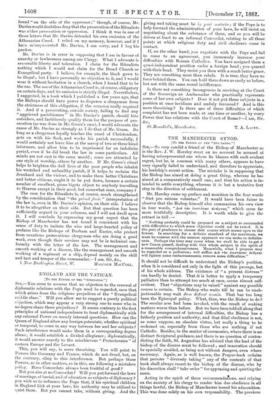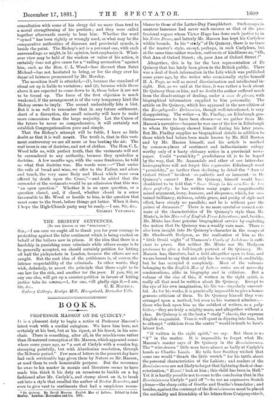THE MANCHESTER SYNOD.
[To THE EDITOR OF THE " ErECTATOR."1 SIR,—S0 very candid a friend of the Bishop of Manchester as is the Rev. J. W. Horsley must on no account be accused of having misrepresented one whom he blames with such evident regret, but he, in common with many others, appears to have
very signally failed to understand, and therefore to appreciate,.
his lordship's recent action. The mistake is in supposing that the Bishop has aimed at doing a great thing, whereas be has aimed at a comparatively small one; and that his action is in- tended to settle everything, whereas it is but a tentative first step in the direction of settlement.
Mr. Horsley sums up preface and monition in the four words " Stet pro ratione voluntas." It would have been fairer to observe that the Bishop himself also summarises his own view
in four words, issal-Zacts cisett-ptsv," which seem far more truthfully descriptive. It is worth while to give the extract in full:— "Nothing probably could be proposed on a subject so surrounded. with difficulties to which some objection could not be raised. It is, the part of prudence to choose that coarse which seems open to the fewest. In searching for a definite standard of the maximum, we must be content with the nearest approach we can make to definite- ness. Perhaps the time may come when we shall be able to get a new Canon passed, dealing with this whole subject in the spirit of a reasonable comprehensiveness. Meanwhile, what I propose may be regarded as a palliation; will suffice Ai a 14)P ?vecrTioTav avdrolv will lighten some embarrassments, remove some difficulties."
It should not be difficult to understand the Bishop's position, when it is considered not only in the light of this passage, but of his whole address. The existence of "a present distress"
can hardly be denied. That it is better to apply a temporary palliative than to attempt too much at once, seems almost self- evident. That "objections may be raised" against any possible course is certain. The Bishop who waits till he can be unob- jectionable may wait &on defluat mauls. That has too long
been the Episcopal policy. What, then, was the Bishop to do F The secular arm had been invoked, with the result of making matters worse than before. But we have been told all along that for the arrangement of internal difficulties, the Bishop has a fatherly position and authority, and that filial obedience is not, as some suppose, an obsolete virtue, but really a thing to be reckoned on, especially from those who are nothing if not Catholic. Besides, in the matter of ceremonies, where there is no distinct Scriptural guidance, and there is no question of contra- dicting the faith, St. Augustine has advised that the lead of the bishop of the diocese must be followed ; and innovation should be specially avoided, as being not without dangers, even where necessary. Again, as is well known, the Prayer-book ordains that persons "diversely taking" any of the contents of that book shall always resort to the bishop of the diocese, who by his discretion shall " take order " for appeasing and quieting the same. Acting in the spirit of these recommendations, and relying on the anxiety of his clergy to render him due obedience in all things lawful, the Bishop of Manchester issued his admonition. This was done solely on his own responsibility. The previous consultation with some of his clergy did no more than tend to a moral strengthening of his positiob ; and they were called together afterwards merely to hear him. Whether the word " synod " has been rightly or wrongly used, or what may be the comparative authorities of diocesan and provincial synods, is beside the point. The Bishop's act is a personal one, with such surroundings as might, in his opinion, best emphasize it. What- ever view may be held of the wisdom or value of his action, it certainly does not give cause for a " railing accusation " against him, such as the Hon. C. L. Wood—less discreet than Saint Michael—has not hesitated to bring, or for the elegy over his departed fairness pronounced by Mr. Horsley. The monition itself is attacked,—(1), because the standard of ritual set up is liable to variation ; and (2), because while those above it are expected to come down to it, those below it are not to be forced up. The force of the first objection is much weakened, if the arrangement is of the very temporary kind the Bishop seems to imply. The second undoubtedly hits a blot. But it is as well to remember that in any future settlement, short of a disruption, the small minority will have to make more concessions than the large majority. Let the Canon of the future be never so comprehensive, it will certainly not establish Congregationalism pure and simple.
That the Bishop's attempt will be futile, I have as little doubt as that it is well meant. The truth is, that in this vest- ment controversy we are all more or less beating the air. The real issue is one of doctrine, and not of clothes. The Hon. C. L. Wood tells us, with perfect truth, that the vestments will not be surrendered to any authority, because they symbolise a doctrine. A few months ago, with the same frankness, he told us what that doctrine was. His words were :—" That under the veils of bread and wine, we offer to the Father, and adore and touch, the very same Body and Blood which were once offered by death upon the Cross,"—and he added that the surrender of the vestments would be an admission that this was " au open question." Whether it is an open question, or a question closed, and, if closed, whether closed in a sense favourable to Mr. Wood or hostile to him, is the question that must come to the front, before things get better. When it does, I hope the High-Church party may be ready.—I am, Sir, &e., GILBERT VENABLES.











































 Previous page
Previous page